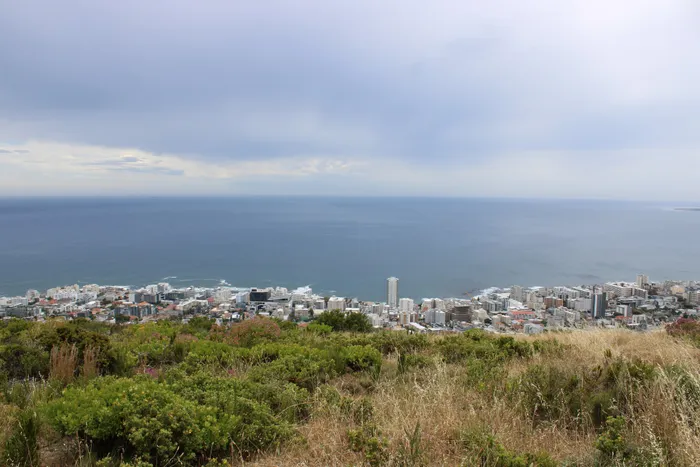Impact of sewage spills at Clifton beaches ’low’

The view of the Atlantic from Signal Hill is beautiful, but what lies beneath the surface?
The City said the impact of the sewage spills which temporarily closed Clifton beaches last week, was “very low”.
Clifton beaches were temporarily closed on Sunday And Monday March 27 and 28, due to sewer pump station failures, according to the City of Cape Town.
Fourth beach was closed to the public on Sunday and reopened on Monday. And then on Monday evening the pump station at First beach also failed, resulting in the beach being closed and reopened the following day.
Mayoral committee member for water and sanitation, Dr Zahid Badroodien, told Atlantic Sun the wastewater at Clifton Fourth and Clifton First beaches, had been contained on the beach.
“’Once the overflows had been repaired the contaminated sand where wastewater had pooled was bagged and removed from the site for proper disposal,” he said.
“The impact on the environment of the two spills is therefore very low. At all times the areas were cordoned off so there was little to no risk to human health.”
Dr Jo Barnes, senior lecturer emeritus in the Faculty of Medicine and Health Sciences at Stellenbosch University, said the sewage spill running over the beach and then into the sea presented the greatest risk of spreading disease.
“Removing the soiled beach sand is cosmetic at best. It does not in any way remove the extensive polluted soil and the polluted water under the surface of the sand. The E. coli numbers are highest in the swash zone (the area where the waves run up to over the sand), but it extends beyond that,” said Dr Barnes.
“Just dig a few centimetres or half a metre into beach sand and the hole quickly fills with seawater. That is the water carrying much higher loads of pollution and where the pollution lasts a lot longer too,” she said.
“The sewage pollution spreads along this subsurface water over quite an area, so digging up a band of sand where the sewage ran over the beach is not going to remove the subsurface pollution at all.”
Dr Badroodien said planned maintenance schedules were in place to ensure that the plants/pump stations were maintained, including inspections which would be conducted by operators. However, he added, failures and breakdowns were unavoidable due to various reasons.
“Please note that the recent incidents that occurred at the Clifton First and Fourth Beach were attributed to motor winding failure and rags being caught in the pump preventing the impeller from displacing fluid resulting in mechanical and electrical damage within the pumps,” he said.
He confirmed that the cost of repair at First beach was R140 000, while at Fourth beach, for two incidents, it amounted to R280 000. Earlier this year the Camps Bay marine outfall suffered a fault (“Camps Bay marine outfall causes a stink”, Atlantic Sun, February 11), and had to be repaired at a cost of R476 000.
“The replacement of electrical and mechanical equipment (pumps, valves) in the pump station is determined by a number of factors which includes the age of the equipment, obsolescence, or the rate of failure of the particular components,” Dr Badroodien said.

According to the 2022 Green Drop national report, Camps Bay has a Green Drop score of 87% and a Wastewater Risk Rating of 40.9%. The Green Drop assessment focuses on the entire value chain (sewer collector, pumping, treatment, discharge) of the wastewater business within the municipalities while the Wastewater Risk Rating (Cumulative Risk Rating) focuses on the wastewater treatment function specifically.
With reference to the Green Drop scorecard, of or greater than 90% is regarded as excellent while a system that achieved less than 31% is regarded as a dysfunctional system which would require appropriate interventions.
“It remains unacceptable that sewage spillages and failing wastewater treatment works are detrimentally impacting our environment as well as the livelihood and health of many of our communities on a daily basis in the year 2022,” said Minister for Water and Sanitation, Senzo Mchunu.
“It is of great concern that there are so many systems with scores below 31%, indicating a dismal state of wastewater management, posing a risk to both environment and public health.”
Professor Leslie Petrik, group leader of Environmental and Nano Sciences at the University of the Western Cape, said she was concerned about the amount of chemical contamination of environmental waters that the report implies.
“Judging from the Green Drop report recently issued there is a disastrous lack of waste water treatment plant maintenance country wide which the Minister says is due to lack of skills and capabilities, and lack of allocation of sufficient funding, or misallocation thereof,” said Professor Petrik.
“Decent municipal services for all are why we pay rates and taxes to our municipalities and government respectively. Camps Bay and Clifton rate payers sewerage charges are not being applied to maintain the infrastructure in their suburbs as far as I can ascertain, but being used to cross subsidize poorer areas, and their sewage is pumped to sea untreated by these pump stations, so it is just a matter of exactly where the untreated sewage is released - whether on the beach or in the bay.”

This past Monday the City announced the new water and sanitation infrastructure budget for the next three years, R529 million of which has been allocated for sewer pump station upgrades.